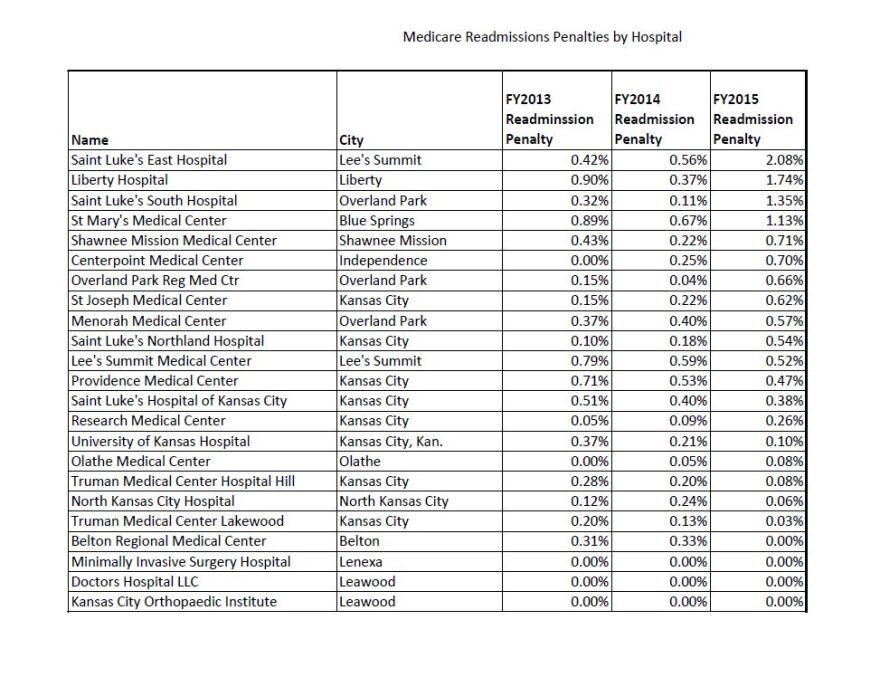Twenty hospitals in the Kansas City area will be penalized by Medicare starting Oct. 1 for excessive readmissions, although eight of them will be hit with lower fines than in Medicare’s previous round of penalties.
Saint Luke’s East Hospital in Lee’s Summit will get hit with the biggest fine, 2.08 percent of its Medicare reimbursements, according to an analysis by Kaiser Health News of data released this week by the Centers for Medicare & Medicaid Services (CMS).
The next biggest fines will be incurred by Liberty Hospital, 1.74 percent, and Saint Luke’s South Hospital in Overland Park, 1.35 percent.
A Liberty Hospital spokesperson said no one was immediately available for comment. Saint Luke’s East and Saint Luke’s South did not return calls seeking comment.
The penalties were put in place by the Affordable Care Act and are based on the number of patients who suffered five conditions - heart attacks, heart failure, pneumonia, chronic lung problems, and elective hip and knee replacements – and were readmitted within 30 days of discharge. The last two categories were added this year.
The idea is to pay hospitals for their performance, not merely for the number of patients they treat.
This is the third year CMS has levied fines for what it deems to be excessive, avoidable readmissions. The penalties are based on readmissions from July 2010 through June 2013.
The maximum fine this year is 3 percent of Medicare reimbursements for all patient stays, not just patients who were readmitted. During the two earlier rounds of the program, the maximum penalties were 1 and 2 percent, respectively.
All told, a record 2,610 hospitals nationwide – or three quarters of those subject to the Hospital Readmissions Reduction Program - will see their Medicare payments reduced for a year starting Oct. 1, according to Kaiser Health News.
More than 1,400 hospitals are exempted from the penalties, including critical access hospitals and certain cancer hospitals.
Last year, Kaiser Health News says, nearly 18 percent of hospitalized Medicare patients were readmitted within a month, costing Medicare $26 billion. Of that amount, Medicare officials estimate $17 billion comes from avoidable readmissions.
Among the 39 hospitals nationwide that will be hit with the maximum 3 percent is one in Missouri – Western Missouri Medical Center in Warrensburg. In the previous rounds, the hospital had incurred no penalties.
In a statement, the hospital said that "while any readmission is not desirable, hospitals such as (Western Missouri Medical Center) are facing payment consequences based on old data from years when less emphasis was placed on post-discharge follow up care."
"In more recent time periods subsequent to these years, WMMC implemented several strategies to reduce the occurrence of avoidable admissions including creation of a discharge process team and post-discharge phone calls to name a few," the statement said.
In Kansas, 34 hospitals, or 26 percent of all hospitals in the state, will be penalized, according to Kaiser Health News. In Missouri, 66 hospitals, or 61 percent of all hospitals in the state, will be penalized.
This story was updated to include comments from Western Missouri Medical Center.




